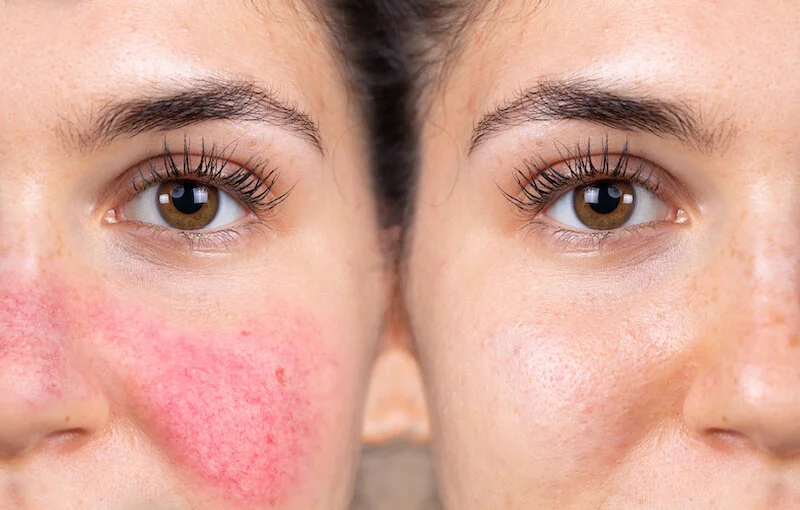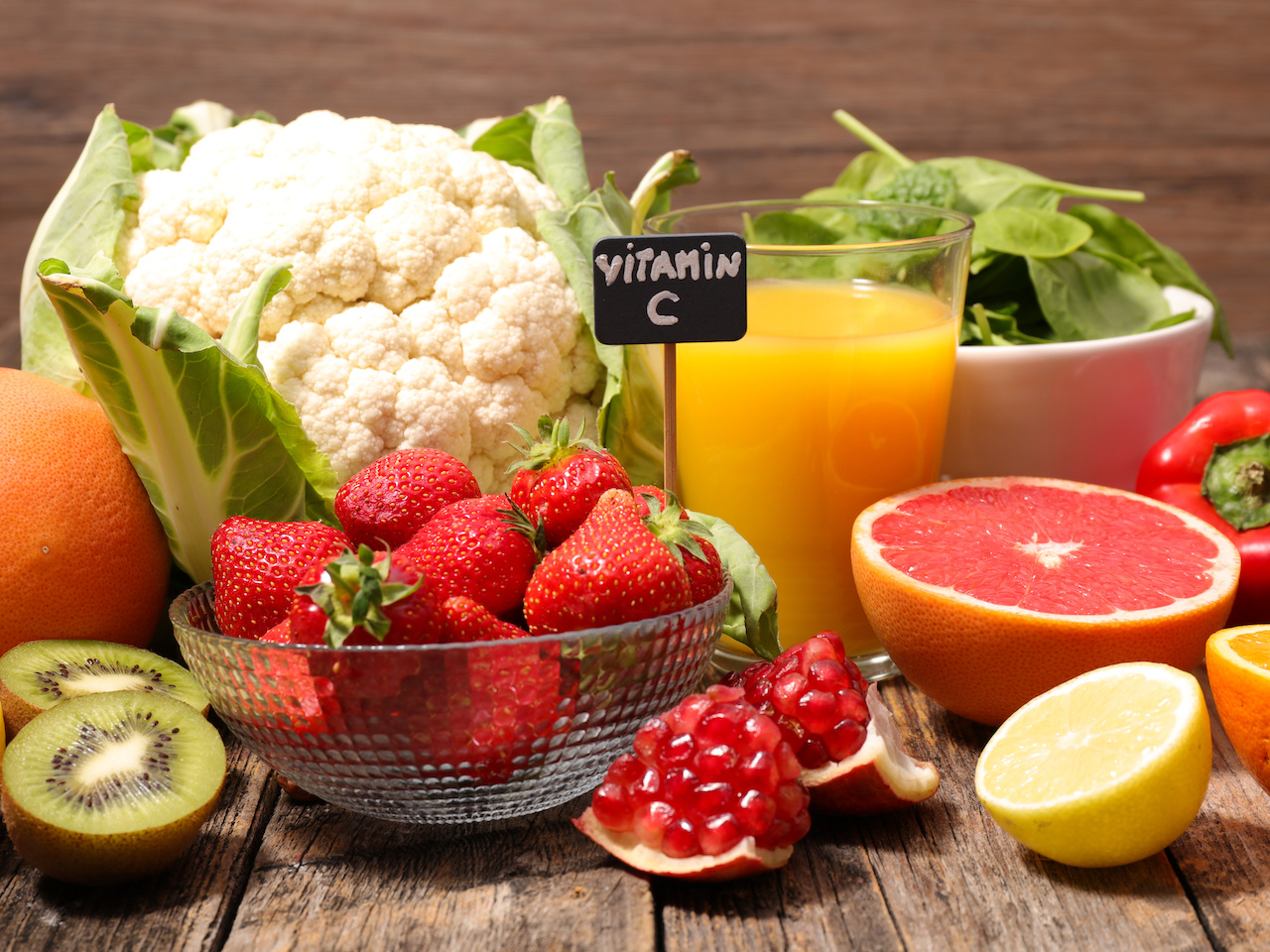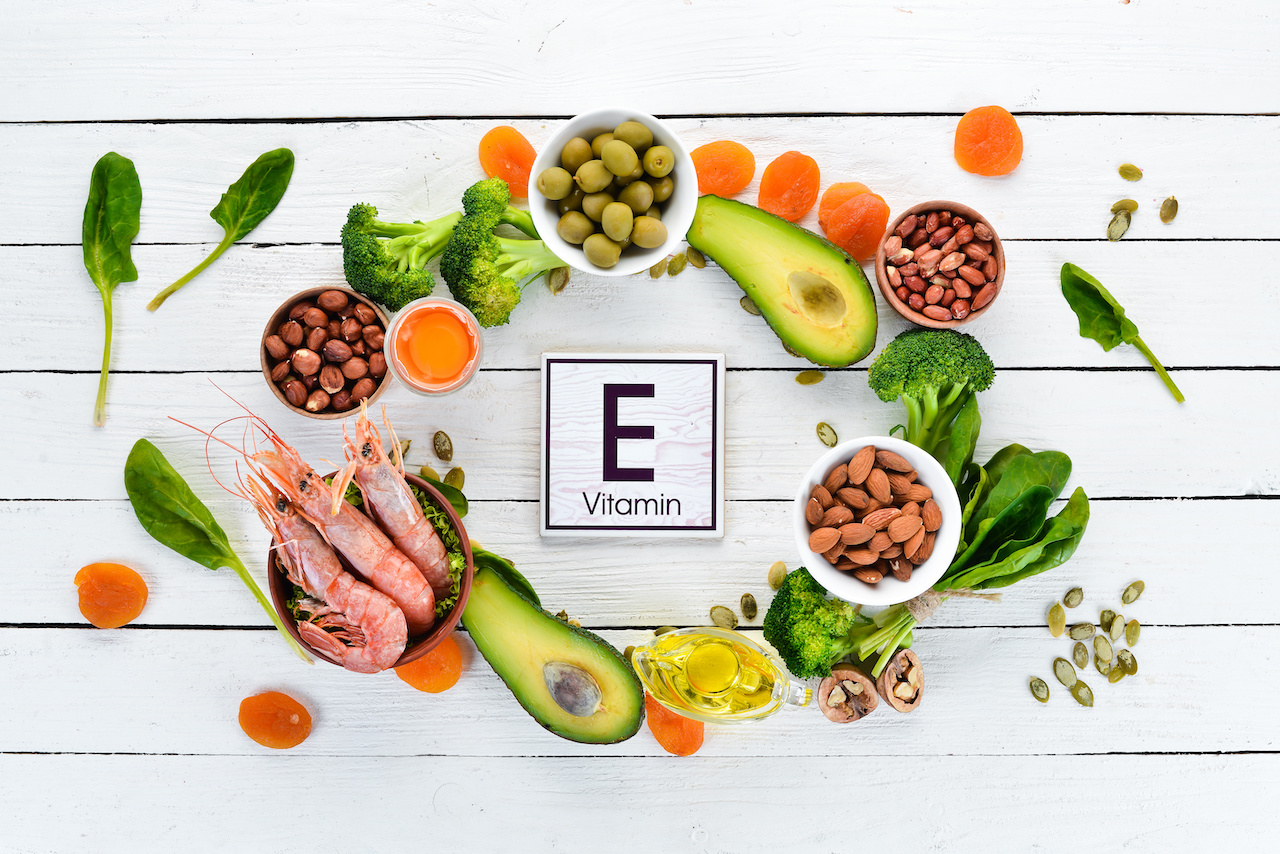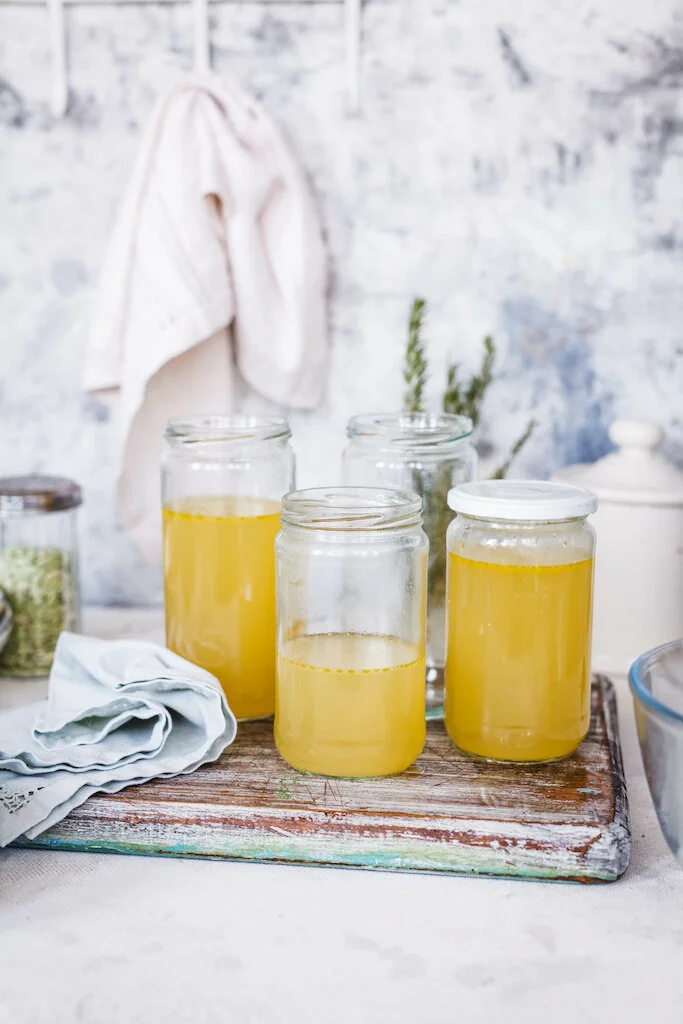How To Treat Rosacea Naturally
Many people have asked me if I have any good advice on how to naturally treat rosacea.
I don’t have a personal experience with this skin disorder, but I know a lot about skin care, inflammatory conditions, causes, and natural treatment options.
What Is Rosacea
This post contains links to the products that I use myself or can recommend. If you buy products through these links, the price will be the same for you, and I will receive a small commission, which helps to support this blog. This is my affiliate policy.
Rosacea is a progressive vascular disorder that affects the face and the eyes. Frequent dilation of blood vessels leads to vascular hyper-responsiveness and structural damage. It progresses in stages known as pre-rosacea, mild rosacea, moderate rosacea, and severe rosacea and has periods of exacerbation and remission. It most commonly occurs in adults between ages thirty and fifty (but not exclusively), and women are affected about three times as often as men, although men have a greater tendency to develop stage four rosacea.
Stage 1 Pre-Rosacea
The main symptom of stage one rosacea is frequent flushing on the cheeks, chin, nose or forehead. A person with pre-rosacea might also experience a burning sensation (especially when cosmetics or lotions are applied to the affected areas), as well as some swelling. However, the symptoms aren’t limited to the physical. Some people who experience persistent flushing may also feel self-conscious.
Stage 2 - Vascular Rosacea
During this stage, small blood vessels on the cheeks and nose may become more visible, which may appear as thin red lines. Small bumps and pimples on the skin may also become visible. Due to the inflammatory nature of the disease, skin areas that are covered by your rosacea might appear puffy or swollen or may feel tender or sensitive. Commonly reported with stage two rosacea is that symptoms of flushing or redness on the face becomes more persistent. Some people may also develop oily skin or dandruff.
Stage 3 - Phymatous Rosacea (Rhinophyma)
When a person’s rosacea reaches stage three, small bumps, some of which contain pus, may appear on the face. These may be painful. Oil glands in the nose and cheeks can become enlarged and inflamed, leading to a buildup of tissue, making your nose appear bulbous. It can take years for rosacea to reach this stage.
Stage 4 - Ocular Rosacea
Ocular rosacea is considered a severe condition which can lead to vision loss. A person with ocular rosacea might experience eye irritation, dry eyes, burning in the eyes, sensitivity to light, conjunctivitis, and vision loss. If your condition shows signs of reaching this stage, you should immediately consult an ophthalmologist.
Not everyone with rosacea advances through all the stages, and rosacea doesn't necessarily develop from stage to stage. A person can for example start directly at stage 2, or stay at one stage for a long time - or always.
Treatment, especially when started early, can help to manage and control symptoms. Known treatments for rosacea include antibiotics and topical solutions. To better assist in managing symptoms you it’s helpful to keep a diary of possible triggers and flares.
What Causes Rosacea
The underlying cause is still largely unknown by conventional Western medicine, but possible causes are:
An overactive immune system.
Leaky gut
Demodex mites
General imbalance in the body
Stress
In Traditional Chinese medicine (TCM) and the Indian holistic healing system Ayurveda; however, it's known that issues with certain imbalances and organs can cause rosacea.
TCM works with imbalances in the liver and gall bladder or the lungs and colon together as causes.
TCM and Ayurveda use the elements air, water, and fire to help heal and balance the body, in a way that Western medicine doesn't do in the same conscious manner. Both these Eastern healing systems also see rosacea as an accumulation of heat or as imbalances in the body's "fire-elements." And it's these "heat" functions or reactions in the body that need to be in balance for us to feel and function optimally.
EXAMPLES OF HEAT AND FIRE-ELEMENTS IN THE BODY:
Digestion (digestive fire)
Spicy food (hot)
inflammation
Stress
Hot temper (anger, impatience, etc.).
When these elements are out of control, it can trigger the ailment. Hence according to these theories, you can ease rosacea by addressing the fire-factors.
7 Natural Steps To Treat Rosacea
We want a little beneficial flame going all the time, but not an uncontrolled raging fire.
What feeds a fire? To keep a fire burning you need fuel, heat, and oxygen. To control heat and fire, you need water, cooling, and anti-oxidants.
In regards to the body, you can control your fire-elements through the following 7 steps:
1. Eat An Anti-Inflammatory Diet, And A Diet Based On "Cool," Fresh And Organic Foods
Cool, sweet, stabilizing, and water-rich foods. I.e., lots of fresh organic vegetables, berries, and fruits with high water content such as pineapple and melons.
Fresh almonds, walnuts and chia seeds. But remember to soak nuts and seeds for at least four hours before you eat them.
Healthy fats from avocado, coconut oil, evening primrose, extra virgin olive oil and ghee from grass-fed animals.
Oily fish like salmon and mackerel, but go for the organic ones to avoid the heavy metals.
Meat from grass-fed organic farm animals - prefer small animals such as poultry.
Avoid
Avoid adding more "fuel" to the system, which means stay away from:
Sugar, caffeine, alcohol, deep-fried and processed foods, and food that is salty, sour, spicy or has a sharp taste such as strong cheese.
Fermented dairy products like buttermilk, sour cream, yogurt, kefir, koumiss, and acidophilus milk.
Grain products - if it's possible for you. Instead, eat bread made from flours like almond flour, coconut flour, quinoa, chestnut flour, hemp flour, tiger nuts flour (chufa). This bread tastes great and is super-smooth.
2. Avoid Immune Boosting Supplements - Eat Instead Plenty Of Antioxidants
The immune system protects the human body from foreign invaders such as bacteria, viruses, and other harmful microorganisms. However, in certain inflammatory skin disorders such as rosacea, immune cells can do more harm than good. In rosacea, the characteristic chronic facial flushing and skin inflammation causes the immune system to become over-reactive because the immune system constantly sends over-whelming numbers of immune cells into the facial skin.
These immune cells then set up camp around facial blood vessels, releasing inflammatory substances that can trigger dilation, weaken blood vessel walls, and cause inflammatory papules/pustules.
Immune cells that set up camp in the skin can release damaging substances such as enzymes and free radicals, directly onto blood vessels. Release of these substances is a normal function that is important in protecting and destroying microorganisms; however, this response is not helpful in rosacea because microorganisms are not involved in rosacea. This response is, in fact, counterproductive to rosacea skin types because the enzymes and free radicals released without the “microorganisms” will in-turn damage facial blood vessels. These enzymes and free radicals falsely released can cause extensive damage to the entire blood vessel wall resulting in functional and structural changes.
Immune-Boosting Supplements that may worsen Rosacea
Reishi Extract
Maitake Extract
Cordyceps Extract
Bovine Colustrum
Beta Glucan
Goldenseal
Elderberry
Echinacea (when taken for more than 7 to 10 days)
Cat’s Claw
Garlic (at high doses this is a potent flusher)
Eat instead plenty of Antioxidants and Superfoods
Antioxidants and “superfoods” are safer for supporting the immune system of rosacea sufferers without triggering inflammation and flares.
One of the best ways to keep your immune system healthy without adverse effects mentioned above for rosacea skin is, to shop your supermarket’s produce aisle. Experts say a diet rich in fruits and vegetables can help strengthen your immune system and reduce inflammation; this is because superfoods contain antioxidants and a rich nutrient-rich, diet can deliver what you and your body need verses overstimulating an immune response.
Antioxidants are vitamins, minerals, and other nutrients that protect and repair cells from damage caused by free radicals.
The three major antioxidant vitamins are:
You’ll find antioxidants in colorful fruits and vegetables – especially those with purple, blue, red, orange, and yellow hues. To get the strongest benefits out of antioxidants, eat these foods raw or lightly steamed; don’t overcook or boil as it decreases their nutritional value.
Beta-carotene
Foods high in beta-carotene: apricots, asparagus, beets, broccoli, cantaloupe, carrots, corn, green peppers, kale, mango, turnips, collard greens, nectarines, peaches, grapefruit, pumpkin, squash, spinach, sweet potatoes, pumpkins, squash, spinach, sweet potatoes, mandarins, tomatoes, and watermelon.
Vitamin C
Foods high in vitamin-C: berries, broccoli, brussels sprouts, cantaloupe, cauliflower, grapefruit, honeydew, kale, kiwi, pomegranate, mango, nectarine, orange, papaya, pepper, sweet potato, strawberries and tomatoes.
Vitamin E
Foods high in vitamin-C: extra virgin olive oil, nuts, broccoli, carrots, silver beets, spinach and leafy green, mango, papaya, pumpkin, red peppers, sunflower seeds and crayfish.
Beta-carotene
Vitamin C
Vitamin E
3. Heal Your Gut And Strengthen Your Digestive System
While it may seem counterintuitive, apple cider vinegar can also help to prevent heartburn by correcting low stomach acid.
The gastric acid is the body's natural weapon against harmful bacteria in the food and must be high to ensure good digestion and nutrient absorption. Contrary to popular belief, heartburn and reflux are often caused by too little (not too much) stomach acid.
Apple cider vinegar is one of the best and natural means to balance the pH of the body and to adjust the stomach acid. Drink a tablespoon before any meal, or if that’s a bit over the top for you then have at least one tablespoon a day, and you'll experience a significant positive change in skin, hair, nails, energy, and overall well-being after a short time.
Heal your digestive system
Your skin is your biggest tell-tale, and your skin is a mirror of your inner health.
Healthy skin starts in your gut. and the four best ways to strengthen your digestion are by:
Eat probiotic rich fermented foods (sauerkraut, kombucha, kimchi etc.) or take a quality probiotic supplement daily. Probiotics improve the body's nutritional absorption, increase the amount of good bacteria that can fight the bad ones, and support the cleansing of the liver and kidneys and the body's detoxification functions - all in all things that contributes to a healthier skin, but also natural remedies to prevent rosacea.
Drink apple cider vinegar. We mention it again, because apple cider vinegar is a fermented food, and the raw, unpasteurized versions are full of enzymes and beneficial bacteria.
Eat Bone Broth regularly. By regularly drinking bone broth or using it in recipes, you can help promote healthy gut integrity while reducing permeability and inflammation. Collagen, glycine, and gelatin are the important players here.
Studies have shown that gelatin is beneficial for restoring strength of the gut lining and fighting food sensitivities (such as to wheat or dairy), helping with the growth of probiotics (good bacteria) in the gut, and supporting healthy inflammation levels in the digestive tract.
Bone broth is easily digested and soothing to the digestive system.
The collagen in bone broth is also an important player to improve digestion and gut health. It helps form connective tissue and therefore “seals and heals” the protective lining of the gastrointestinal tract so that food particles, larger molecules, and toxins are kept inside the intestines where they belong and don't slip into the bloodstream where they can kick off an inflammatory cascade.
Collagen also helps with the absorption of water within the intestines, keeping things moving more freely out of the body.
These gut healing properties also support the immune system function and a healthy inflammation response.
Consider supplementing with MSM powder, as MSM has shown to relieve rosacea and improve skin, hair, and gut.
4. Protect Your Face From The Sun
Get some sun, but avoid sunshine on your face. Use a hat with wide shade or use a sun protection product that doesn't irritate your skin - it can be hard to find, but fortunately, you can easily make your sun protection oil with coconut oil and zinc oxide. It takes 5 minutes. This home-made sun protection oil is completely clean, gentle and safe.
5. Avoid body Heating Activities
Avoid getting too warm, therefore, avoid saunas and hot activities and prolonged hard physical exercises like long-distance running. Go walking in nature instead or do interval training max. 20 minutes 1-2 times a week.
6. Keep Your Mind And Feelings Cool
A significant part of the rosacea treatment is to manage your stress level. Emotions like anger, frustration, resentment, impatience can really back up the liver and gall bladder, and they can also affect the lungs and colon - the organs that are chiefly responsible for the rosacea flare-ups according to TCM.
Tools to cool mind and emotions
Daily breathing exercises
Meditation and mindfulness practices
Gratitude practices
Sound therapy
Psychotherapy
Hypnotherapy
Walks in nature
Journaling
7. Choose Rosacea Friendly Skincare And Cleaning Products
Choose your products carefully. Whenever possible avoid chemical additives in your skincare, laundry detergent, and cleaning products. Use natural skincare and cleaning products when possible. You want to help your skin feel more comfortable, so pamper it with nice, gentle products.
When shopping for products, read the list of ingredients before you buy. To reduce the likelihood of a buying a product that will irritate your skin, you want to avoid anything that contains:
Alcohol
Camphor
Fragrance
Glycolic acid
Lactic acid
Menthol
Sodium laurel sulfate (often found in shampoos and toothpaste)
Urea
Book inspiration: The Organically Clean Home
Your Guide To The Best Rosacea Skin Care Routine
Be very gentle and caring with your skin.
Rosacea skincare is first and foremost about moisturizing, protecting, and cleansing, but without irritating your skin, that means choosing carefully gentle products.
1. Avoid Rubbing Or Scrubbing Your Face
Stay away from facial scrubs, exfoliating products, washcloths, facial sponges and other harsh products as these irritate your skin can worsen rosacea.
2. Cleanse Your Face Twice A Day — Gentle, Gentle, Gentle
Cleansing when you wake up and before you go to bed helps remove oil and dirt that can irritate your skin. Use a non-irritating cleanser, with a pH between 4,5 - 5,9 (pH on my Hydrating cleansing Gel is 5,2). The skin has an acid mantle that protect it from bacteria, environmental pollutants, and moisture loss. The acid mantle is made up of natural oils, sweat, and dead skin cells, and is slightly more acidic in nature to prevent these harmful (naturally alkaline) contaminants from penetrating and damaging the skin. The higher the pH of a soap, the more it “de-oils” and interferes with the skin's balance.
3. Use A Good Moisturizer Every Day
Whether rosacea makes your skin dry or oily, it’s important to moisturize. Moisturizing helps hydrate your skin by trapping water in your skin. This can reduce irritation and make your skin feel more comfortable.
Studies show that applying a rosacea friendly moisturizer or barrier repair cream can also improve the results you see from treatment.
Look for creams containing ceramides, hyaluronic acid or glycerin, because that are ingredients you want in your moisturizer, as these active substances - especially the ceramides - improve the skin's barrier and significantly, thus reduce the rate at which moisture evaporates through the skin surface.
4. Test Skin Care Products And Makeup Before Applying Them To Your Face
If you’ve never tried a product or it seems that everything you apply to your face stings, testing can help. To test a product, dab a small amount near (but not on) your rosacea-prone skin. If it irritates your skin (burning, stinging, etc.) within 72 hours, you know not to use it.
5. The Best Oils And Essential Oils For Rosacea
Natural plant oils such as extra virgin olive oil, unrefined coconut oil, and especially evening primrose oil are excellent for rosacea. Essential oils are also good to use in skin care, but always mix them with the carrier oils.
These essential oils have cooling and anti-inflammatory properties that can relieve and calm symptoms and flare-ups.
Chamomile oil, Roman (anthemis nobilis): Anti-inflammatory, cooling, soothing, relieves redness and itching.
Chamomile, German (matricaria chamomilla): Anti-inflammatory, cooling, soothing, calming redness, calming itching.
Helichrysum (helichrysum italicum): Anti-inflammatory, cooling, promotes healing.
Lavender (lavandula angustifolia): Anti-inflammatory, cooling, promotes healing.
Rose (pink damascena): Anti-inflammatory, cooling, sedative, can reduce enlarged capillaries.
Sandalwood: Anti-inflammatory, cooling, sedative, can reduce enlarged capillaries.
Related posts:
Disclaimer:
All information in this blog is strictly for informational purposes only and should not be taken as medical advice. The statements made in this blog have not been evaluated by The Danish Health Authority. The products linked to in this blog and any information published in this blog are not intended to diagnose, treat, cure, or prevent any disease. The information provided by this blog is not a substitute for a face-to-face consultation with your physician, and should not be construed as medical advice. The entire contents of this blog are based upon the opinions of Hanne Robinson. By reading and using this blog, you agree to only use this publication for personal informational use and not as a substitute for medical or other professional advice.






















